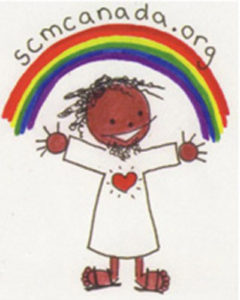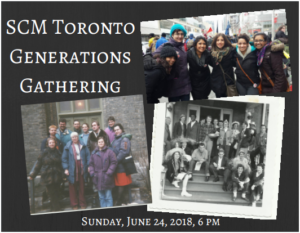The Student Christian Movement of Canada is seeking a Festival, Retreat and Resource Coordinator for a summer position, available to anyone who is a student returning to fulltime study in September, between the ages of 18-30.
The position is based in Toronto, ON, with some flexibility around work location.
$15 per hour, 30 hours a week, 8 weeks – June 4 to July 27, 2018 (some date flexibility available)
Tasks and Responsibilities
- Cahoots Festival follow up, feedback analysis and organization
- SCM Fall Retreat logistics planning and coordination
- Create study resource on a faith and justice priority topic
- Other tasks (filing, writing) as assigned
The Festival, Retreat and Resource Coordinator will support the Cahoots festival (SCM annual event) with follow up, feedback analysis and initial organisation work. The Coordinator will gather information and contacts, act as point person for participants and communicate with participants after the end of the Festival. Attend online and in-person meetings with the Festival organizing crew. Conduct an audit of the Festival’s constituency with specific focus on cultural background and communities represented, to promote greater diversity. Help planning location and schedule for a follow up event. Conduct a survey on the success and challenges of the festival.
The Coordinator will work on logistics for the SCM Fall Retreat which will take place on Toronto Island in September/October. This will include facility booking, arranging travel and accommodation, creating advertising materials and recruiting participants. It will require long-distance coordination with our host organisations, developing capacity and creating online tools for coordination and registration.
The Coordinator will also be responsible for creating a resource for study groups to use that will focus on a faith perspective on a social issue. In the past these resources have looked at peace, disability, gender equality etc. They will design and research the resource, and recruit writers and artists to help produce it. The resource will then be distributed free of charge through the SCM website.
Other tasks will be worked out as part of the supervision plan and will take into account the skills and experience of the successful applicant.
Supervision and Skills
Through supervision and mentorship both by the General Secretary and Committee members, the Festival, Retreat and Resource Coordinator will develop skills including:
- Work independently and within a team
- Problem-solving and decision-making skills to meet challenges and obstacles
- Facilitating meetings and discussions
- Communicating with different groups and communities
- How to promote/market events
- Research and resource development
- Time management skills and how to prioritize tasks
We are looking for students who have:
- Understanding of the political and theological orientation of social justice and faith movements
- Experience or exposure to SCM’s work on a national or regional level and/or experience in an organization with similar vision
- Interest in the Christian ecumenical movement and in working in such an organization.
- A commitment to working in an anti-oppressive framework, including anti-racist, feminist, and LGBTQIA2+ inclusive & affirming.
- The desire to develop skills in event planning, resource creation, and working with church communities & faith based organizations.
Application Instructions: Send a short letter (350 words at minimum) about your interest in the position and why you are suited for it, and tell us about yourself and your studies.
Include a copy of your CV.
The SCM especially encourages applications from those who are Black, Indigenous, People of Colour, and a range of gender identity, sexual orientation, and ability. If you are comfortable doing so, please identify this in your application letter.
Send application to: hiring@scmcanada.org by May 29, 2018
About Student Christian Movement (SCM)
The SCM is a progressive network engaged in social justice and faith. We are a non-dogmatic community of diverse belief systems where faith and radical political action flourish.
This position is made possible by funding through the Canada Summer Jobs program.
Download and share the 2018 Summer Job Overview









